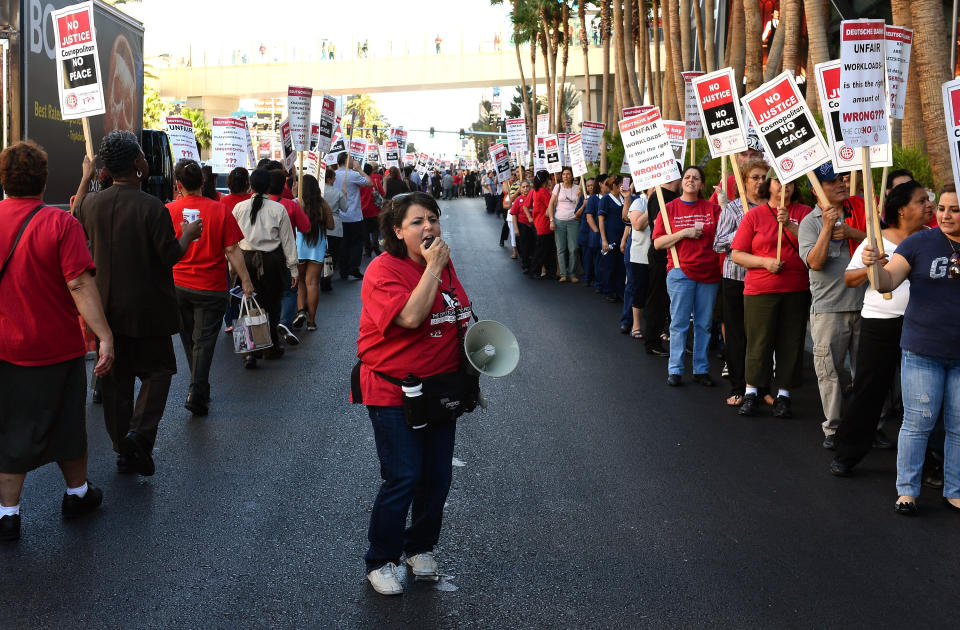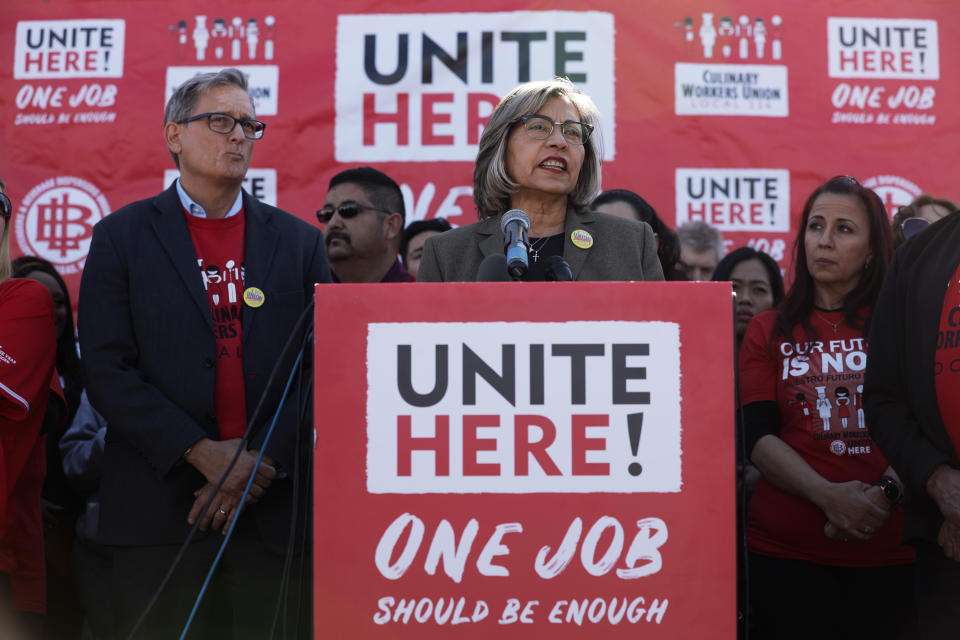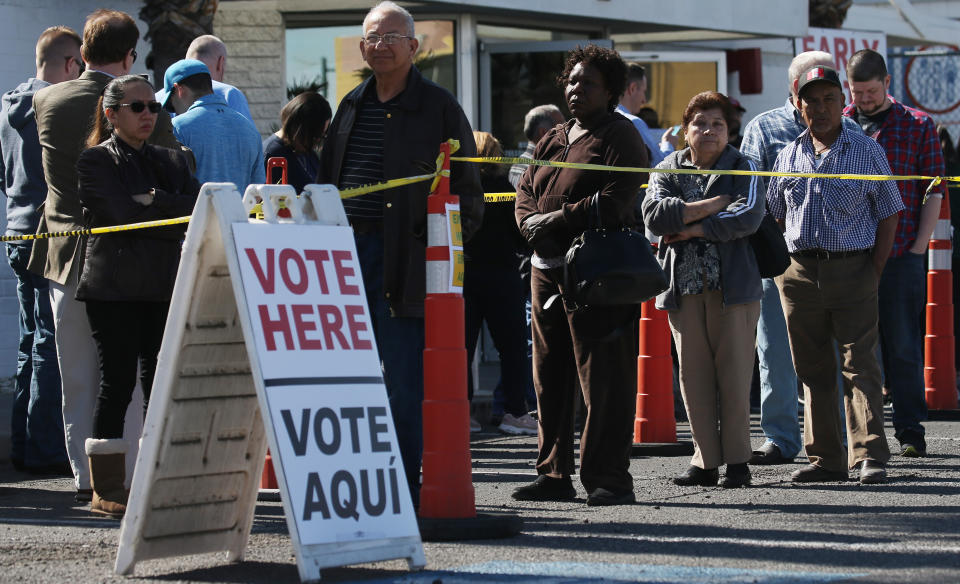Why A Major Nevada Union Is Supporting Bernie Sanders
LAS VEGAS ― As Sen. Bernie Sanders (I-Vt.) closed the books on his narrow win in New Hampshire primary on Feb. 11, criticism from Nevada’s Culinary Workers Union ― the most powerful labor organization in the state ― marred his victory party.
Union leaders worried that Sanders’ signature policy proposal, Medicare for All, would replace a health plan they fought decades to build in favor of an untested alternative ― and were doing their best to share the concerns with the union’s 60,000 members.
Over the following days, the policy disagreement escalated into a public dispute as the union reported verbal abuse and doxxing of its leadership by people who described themselves as Sanders supporters. Sanders’ rivals, along with the national media, which often treat unions as an afterthought, were suddenly knee-deep in the minutiae of multi-employer health care plans.
But what got lost in the legitimate discussion of the potential impact of Sanders’ feud with the Culinary is that Nevada’s sizable labor movement is as divided over Sanders’ candidacy as it is about Medicare for All.
And unlike the Culinary, which has chosen not to endorse in the primary, at least one union that is less antagonistic to Medicare for All has jumped into the race. The Clark County Education Association, or CCEA, which represents over 18,000 educators, announced in mid-January that it was endorsing Sanders.
“We have more labor endorsements than anybody in this campaign,” said Sanders campaign senior adviser Chuck Rocha, referring to the more than two dozen local and international labor unions that have gotten behind Sanders’ bid. “Those are the organizations we’re working really hard to get.”

Health Care Experiences Shape Nevada Union Politics
CCEA has some of the qualities that would seem to fit with Sanders’ proposals. As one of the only union locals in the country not affiliated with a state or international labor union, its independence rivals that of the curmudgeonly senator from Vermont. It severed ties with the state affiliate of the National Education Association in April 2018 in a dispute over how its dues were being used ― CCEA President John Vellardita likened the state group to an “ATM machine” ― and has been in a low-level war with the powerful international union ever since.
The key draw for CCEA’s membership was union members’ “trust” in Sanders as a champion of working people, according to Vellardita. And in terms of specific policies, Sanders’ commitment to raising teacher pay to at least $60,000 was also a big selling point, according to Kenny Belknap, a CCEA executive board member and ardent Sanders supporter.
But crucially, the union is not averse to Medicare for All, because it recognizes that there are limits to what it can achieve through its own negotiating.
“Doc costs, hospital costs, pharmacy costs ― we can try to control or contain or get something out of the employer, but in the end, we’re part of a market,” Vellardita told HuffPost. “What you have today, you may not have tomorrow.”
Vellardita’s logic exemplifies a broader divide within organized labor between unions like his that see their existing health care benefits as precarious and would prefer to free up negotiating power for other priorities, and unions like the Culinary that have more generous health care coverage and treasure gains they have achieved over decades of fighting.
The Culinary and building trades unions like the International Brotherhood of Electrical Workers, which has endorsed Joe Biden and released a video on Wednesday of its members blasting Medicare for All, administer multi-employer health insurance plans known as Taft-Hartley plans. The plans offer unique benefits for union members who may not work at the same job site or hotel for a prolonged period of time, but can stay continuously insured as long as they remain union members.
In a so-called right-to-work state like Nevada, the plans are also a convenient way for unions to encourage workers, who are not required to pay dues to the union, to do so. It’s undoubtedly part of the reason why the Culinary estimates that its 60,000 dues-paying members make up about 95% of the workers it represents. (CCEA, by contrast, has a membership rate of 65% ― just over 10,000 people.)
The insurance plans also can be a source of revenue for unions and occasionally, jobs for friends or relatives of union leaders. For example, a report in The American Prospect noted that Bobbette Bond, who is married to D. Taylor, the head of the Culinary’s parent union Unite Here, holds a senior staff position on the Culinary Health Fund.
In a bid to assuage their concerns, Sanders has promised unions that the health care they would receive under Medicare for All would be at least as generous as their current plans, which typically feature modest out-of-pocket costs for some forms of care.
He even updated his Medicare for All legislation in August to include a provision allowing unions to go back to the bargaining table to ensure that any savings their employers achieve due to Medicare for All would be returned to unions in the form of pay increases or other concessions.

But Geoconda Argüello-Kline, the secretary-treasurer of the Culinary, doesn’t buy it. Speaking to reporters after an event at the Culinary union hall on Tuesday featuring Sens. Elizabeth Warren (D-Mass.) and Amy Klobuchar (D-Minn.), Argüello-Kline cited the union’s successful 6 1/2-year strike at the Frontier hotel ― one of the longest work stoppages in the country’s history ― to show how hard it has been to win the union’s existing benefits.
Referring to the prospect of the mammoth casinos on the Las Vegas strip bargaining to offset the loss of a health care plan, Argüello-Kline said flatly, “They’re not going to give it to us.”
The CCEA’s Vellardita told HuffPost that he, too, appreciates the health care plan that his union has fought to win, and takes solace in his belief that Sanders will not succeed “overnight” in abolishing private health insurance.
“This requires a multi-year plan,” Vellardita said. (Indeed, even Sanders imagines a four-year transition, though it is likely to take much longer with congressional resistance.)
But others noted that CCEA has been unable to win protections at the bargaining table that are as strong as Medicare for All. Over the years, educators have lamented that the union’s insurance plan, underfunded by the school district, left them with unexpected coverage restrictions and high out-of-pocket costs.
“Their health insurance is a disaster,” said Clark County Commissioner Tick Segerblom, one of the state’s few elected officials to endorse Sanders. “That’s a classic case of where Medicare for All will be a huge benefit.”
Love HuffPost? Become a founding member of HuffPost Plus today.

A ‘Class Struggle’ Ideology?
In the course of Sanders’ dispute with the Culinary, other unions revealed they also had a less antagonistic view toward Medicare for All. The heads of Service Employees International Union Local 1107, which represents health care industry workers and civil servants, and the Western States Regional Joint Board, of which the local is a part, issued a statement implicitly condemning the Culinary for framing Medicare for All as an attack on workers’ rights.
“The debate over whether working Americans need Medicare for All or union-negotiated health benefits is a false choice,” SEIU 1107 executive director Vergara-Mactal and the regional board’s Maria Rivera said in a joint statement. “While some working people have good healthcare plans through their jobs, many do not. Access to quality healthcare shouldn’t be based on luck, it should be a right.”
Brian Shepherd, SEIU 1107’s chief of staff, clarified that the union does not have a position on whether Medicare for All is superior to other paths to universal health care coverage. The union simply does not appreciate politicians using their supposed support for unions as a moral shield for their opposition to Medicare for All, he said.
“It really does divide working people when unions are cited as the reason certain candidates don’t support Medicare for All ― or health care for all,” Shepherd said.
Beyond the divergent circumstances that shape the various union perspectives on Medicare for All, and implicitly on Sanders, there are genuine ideological differences that separate more cautious unions like those frightened by Medicare for All from more radical ones that embrace it.
“The vast majority of unions have as one of their goals building up wages, benefits for all working people, but there are some unions that are more attuned to overall class struggle,” said Nathan Ring, a labor attorney based in Las Vegas who represents unions.

Which Nevada Union Will Have The Biggest Impact?
Vellardita insisted that the Culinary’s refusal to endorse in the primary is a downward inflection point in its much-vaunted influence in Nevada politics.
The Culinary “earned a reputation that I’m not sure is up to snuff in today’s election cycle,” he said. “They clearly knew they couldn’t pick a winner.”
But the Culinary is still advising its members that Sanders, and to a lesser extent Warren, are proposing a health care policy that would jeopardize their union benefits. And CCEA does not have anything close to the Culinary’s voter mobilization operation.
Vellardita could not refer HuffPost to voter education materials that it has sent to its membership akin to the candidate scorecard distributed by the Culinary. CCEA estimates that some 100 members, including Belknap, canvass regularly for Sanders. The union does not have educator-specific field organizing tactics. Instead, the canvassers participate as ordinary volunteers getting their canvassing material from the Sanders campaign.
“They just don’t have anything near the influence that Culinary has,” said Segerblom, who estimated that Culinary members typically constitute between 10% and 20% of caucusgoers. “The Culinary really has a history of delivering.”
For its part, SEIU 1107 is incapable of joining CCEA in endorsing Sanders, even if it wanted. The international union of which SEIU 1107 is a part has forbidden its local affiliates from endorsing presidential candidates, absent an endorsement from the international. (Speaking in a personal capacity, Shepherd, the local union’s chief of staff, advertised his decision to caucus for Sanders on Twitter.)
An outstanding question as the caucuses approach on Saturday is the degree to which the Culinary’s skepticism of Medicare for All will meaningfully eat into the support for Sanders, in particular.
At the Culinary union hall event on Tuesday where Klobuchar and Warren spoke, Diana Thomas, a Flamingo employee, said she plans to caucus for Biden.
“I identify with a person who’s for my insurance,” she said.
On the other side of the union hall, where Nevadans were waiting in long lines to caucus early, another union member, Emilio Ruiz, was leaning toward Sanders.
What had he heard about Sanders? “Not much,” Ruiz said. He just liked what he’d read about the Vermont senator. A co-worker spoke highly of him, too.
Related...
The Case Against A 'Medicare For All' Litmus Test, Courtesy of Ocasio-Cortez
Bernie Sanders World Isn't Preparing For A Convention Fight Just Yet
5 Takeaways From The Nevada Democratic Presidential Debate
The 2020 Democratic Debate In Nevada Was The Most Watched In History
This article originally appeared on HuffPost.

 Yahoo News
Yahoo News 